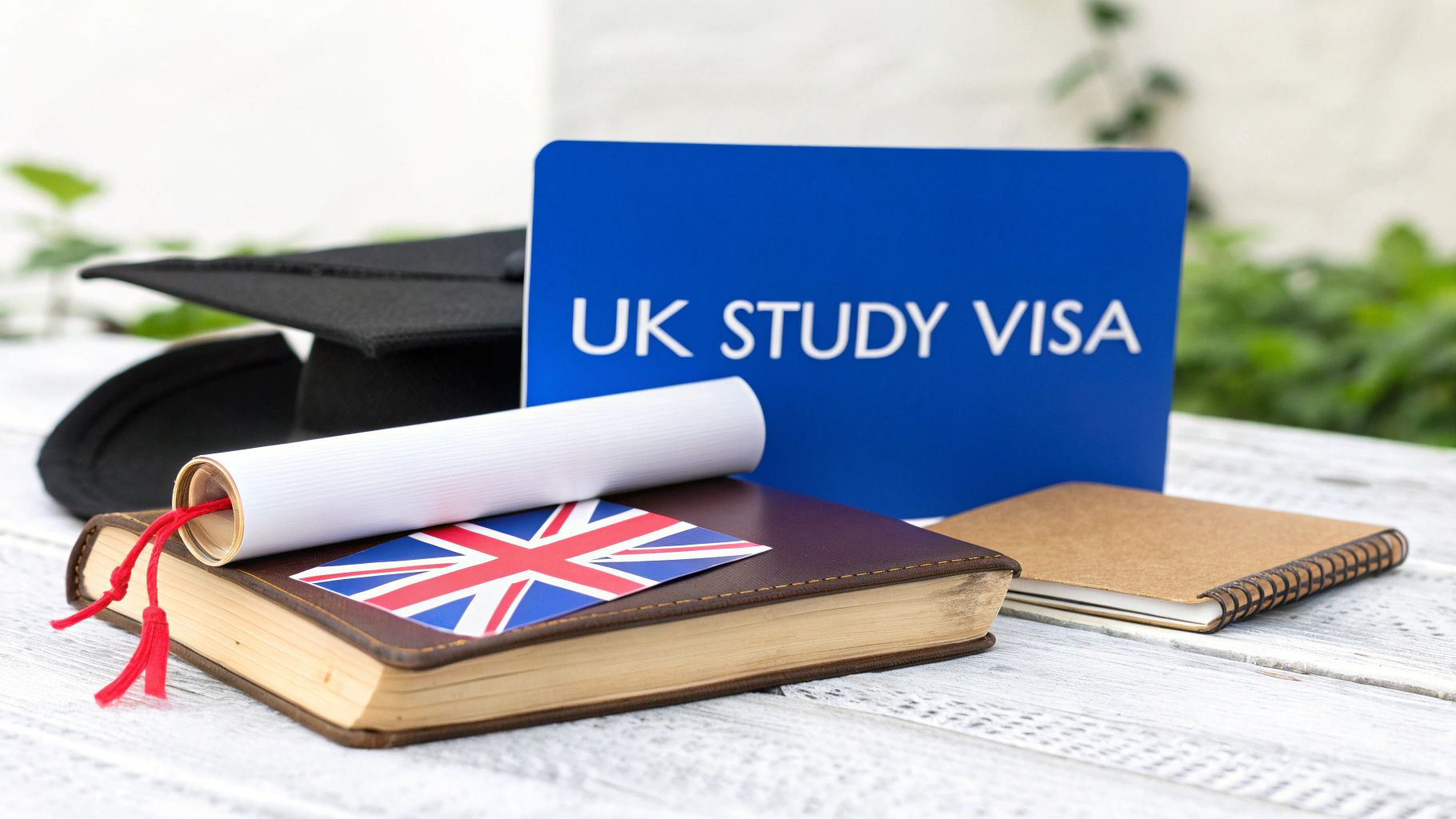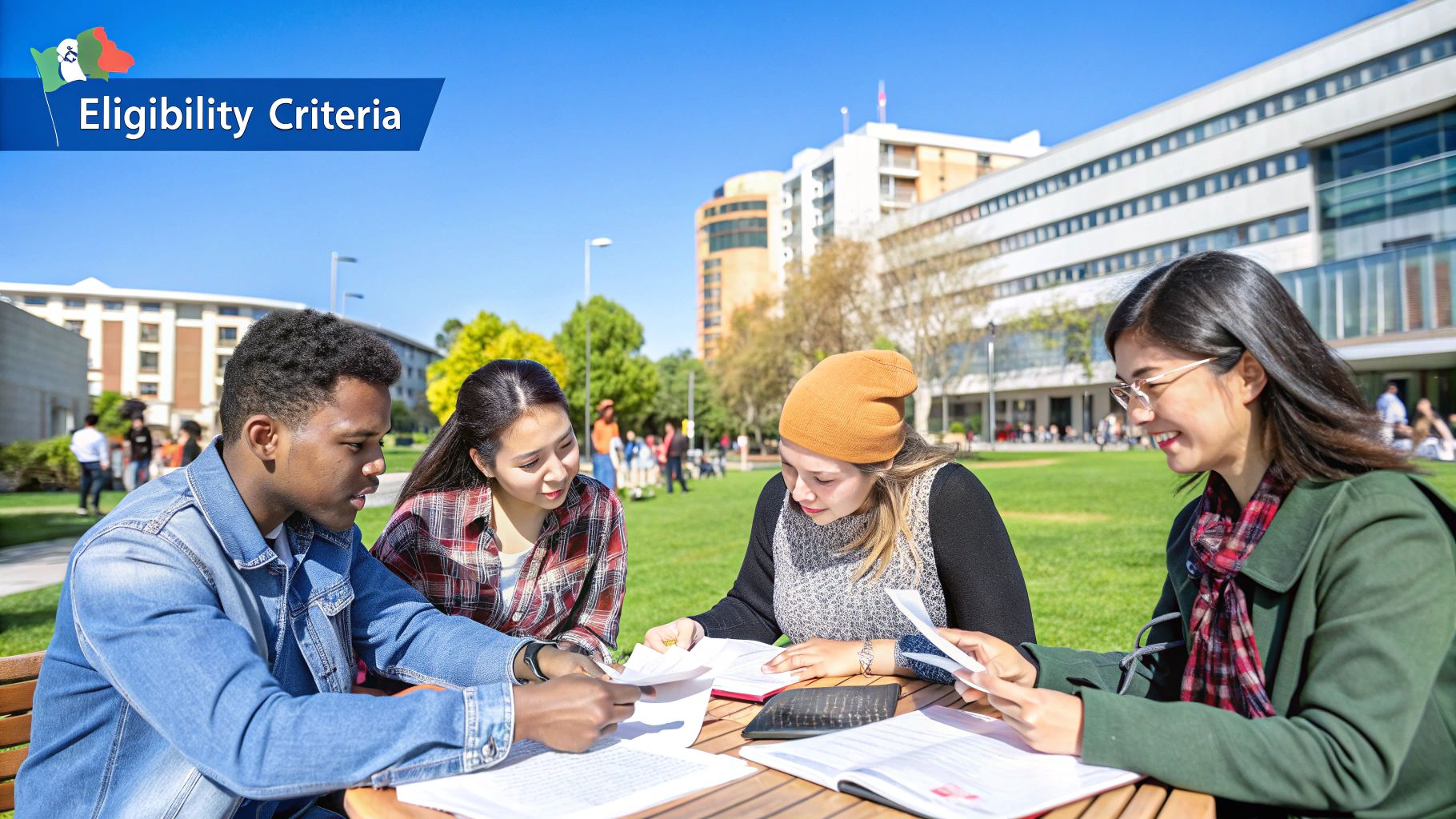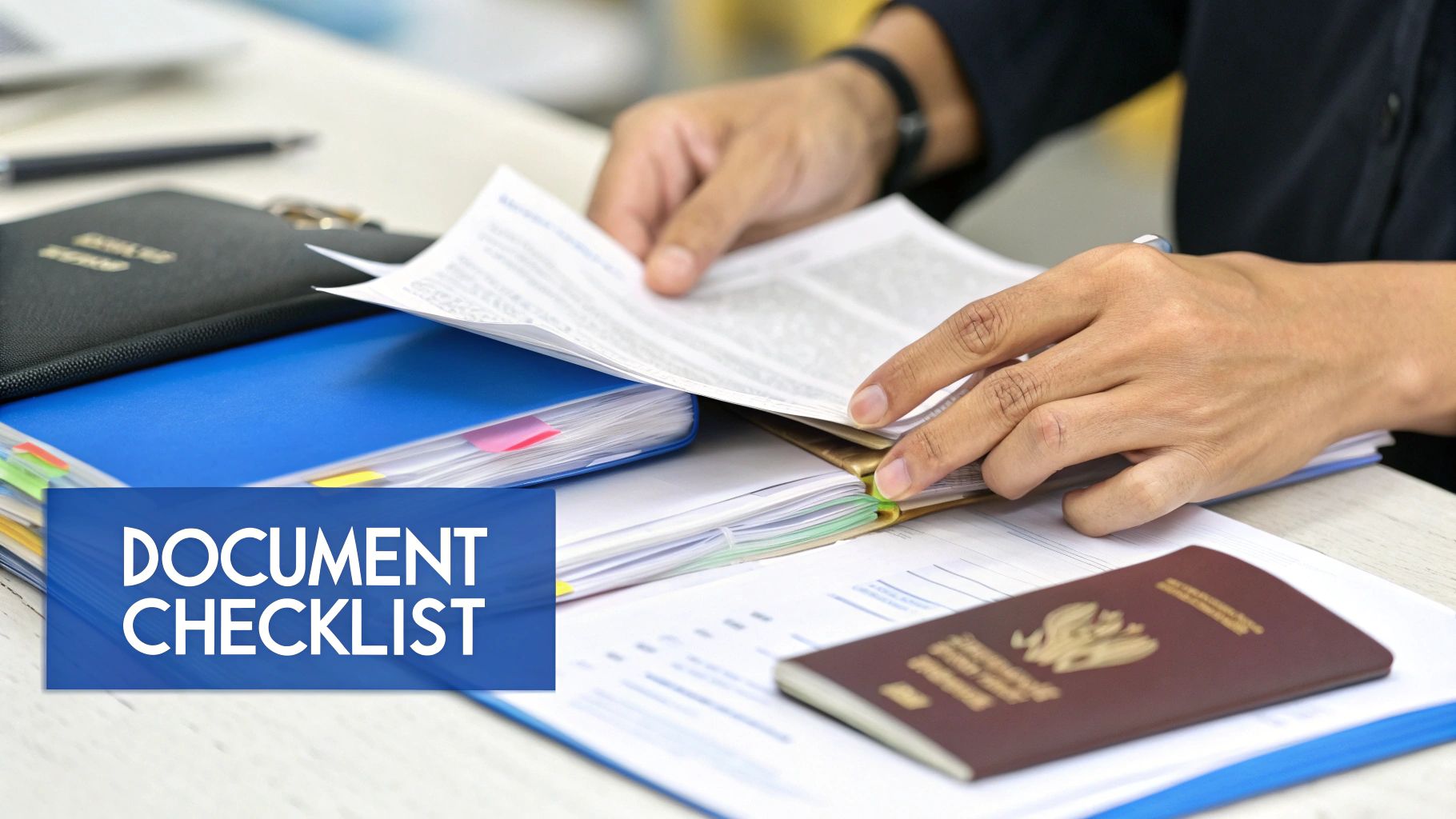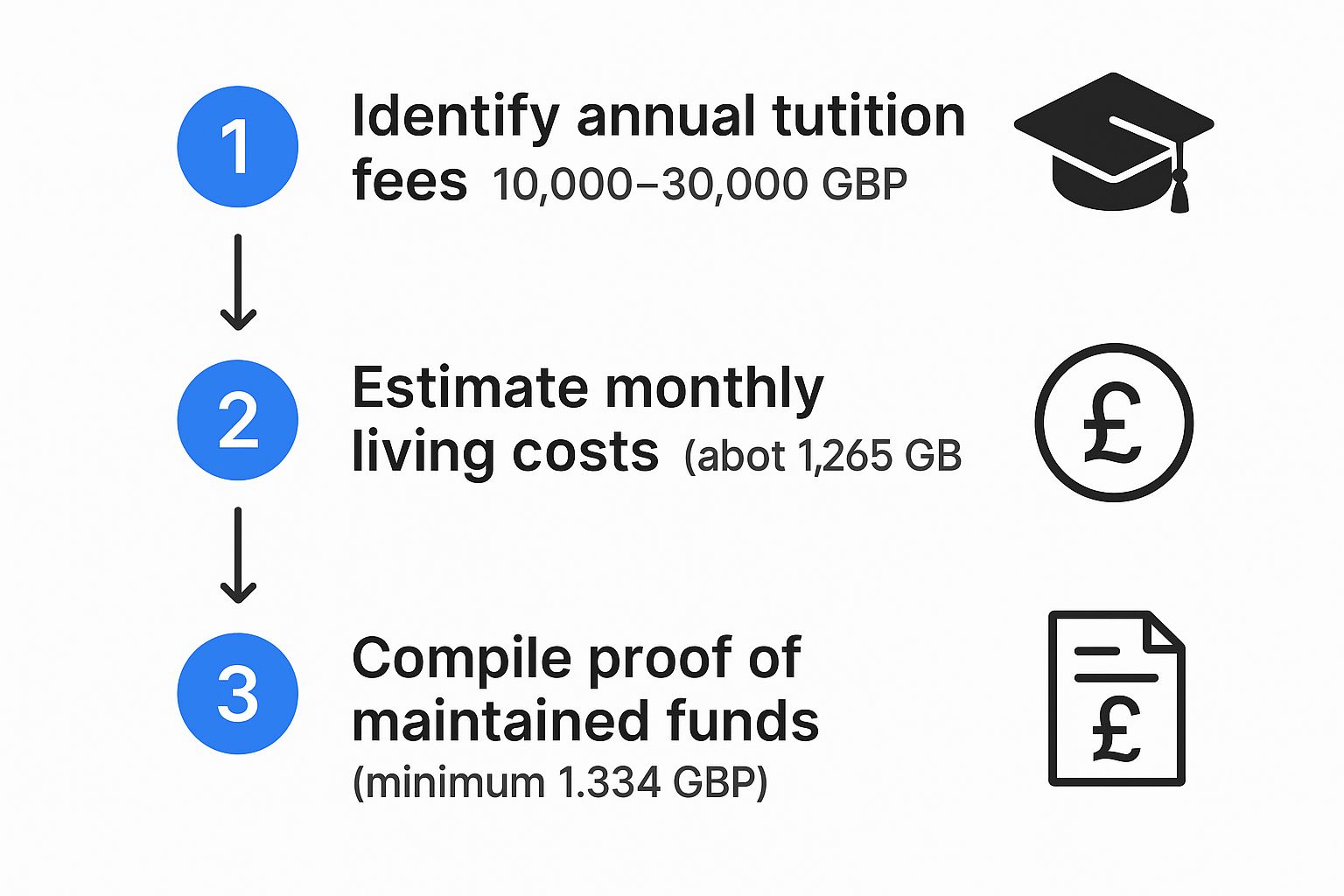UK Education Visa Requirements a Complete Guide

So, you're ready to start your study adventure in the UK? That's fantastic. But before you can dive into lectures and campus life, there's one essential hurdle to clear: securing your student visa. Think of it as your official ticket to entry. The whole process boils down to a few key things: proving you have a confirmed place at a licensed university, showing you can pay for your course and living costs, and meeting the required English language standards.
This guide is designed to be your step-by-step manual, breaking down what can feel like a complicated process into manageable parts.
Your UK Study Journey Starts Here
Applying for a UK student visa is a bit like planning a major trip. You wouldn't just show up at the airport without a ticket, a passport, or a place to stay, would you? Your visa application needs that same level of careful planning. For Nigerian students, this is a well-worn path, but knowing the specific signposts and potential bumps in the road is crucial for a smooth journey.
The good news is that the UK system is built on points. It's not a mystery box where you just cross your fingers and hope for the best. You need to earn a set number of points across specific categories to be successful, which makes it a very clear and predictable process once you know what's required.
The Pillars of Your Application
Your application is basically built on three solid pillars. If one of them is weak, the whole thing can wobble. Let's look at them:
-
University Sponsorship: This is more than just an offer letter. It’s a formal sponsorship from your university, officially recorded in a document called the Confirmation of Acceptance for Studies (CAS). It’s the cornerstone of your application.
-
Financial Proof: This is a big one. You absolutely must demonstrate that you have the money to cover your first year's tuition fees plus a specific amount for living costs. The rules around this are very strict, so it pays to get it right.
-
Genuine Intent: The UK Visas and Immigration (UKVI) team needs to be confident that you are a genuine student whose primary reason for coming to the UK is to study, and that you intend to return home after your course.
The best way to approach this is to see your application not as one massive, intimidating task, but as a series of smaller, achievable steps. Every single document, from your CAS letter to your bank statements, is a vital piece of the puzzle that gets you closer to your goal.
To help you get started, here's a quick look at the core components we'll be diving into. Consider this your packing list before you start the real work of putting your application together.
Core Components of Your UK Student Visa Application
This table summarises the essential pillars of a successful application. Getting these three things right is 90% of the battle.
| Requirement | What You Need | Its Purpose in Your Application |
|---|---|---|
| Confirmation (CAS) | A unique reference number from your university. | Officially proves you have a place on a course. |
| Financial Evidence | Bank statements showing funds for tuition and living. | Demonstrates you can support yourself financially. |
| English Language | An approved test score or qualification exemption. | Confirms your ability to study in English. |
Nailing these three elements is the foundation of a strong application. In the next sections, we'll break down each one in much more detail so you know exactly what to do.
The Role Of Your CAS Letter

Think of the Confirmation of Acceptance for Studies (CAS) as the single most important document in your visa journey. It’s far more than just an offer letter from your university; it’s your official, electronic hall pass that confirms a UK institution is sponsoring your studies.
Without a CAS, your visa application simply can't move forward. It holds the unique reference number that unlocks the GOV.UK application portal, serving as the cornerstone of your entire case. It's the official signal to UK Visas and Immigration (UKVI) that a licensed sponsor has vouched for you and offered you a place on a full-time course.
What Your CAS Contains
Your CAS isn't just a random number. It's a detailed digital file that contains all the key information UKVI needs to review your application. It’s a snapshot of your academic placement and stands as one of the most critical parts of the entire process.
Here’s a look at the details packed into your CAS statement:
- Your unique CAS reference number: The key you’ll plug into the application form.
- Your personal details: This must match your passport, including your full name and passport number.
- The university's sponsor licence number: Proof they are a Home Office-approved sponsor.
- Full course details: The exact title, academic level, and the official start and end dates of your programme.
- First-year tuition fees: The total cost for your first year of study.
- Any fees already paid: This shows any deposits you've paid for tuition or university accommodation, which gets deducted from the total funds you need to prove.
After you've firmly accepted your university offer and paid any necessary deposit, the university will generate your CAS. You can usually expect to receive it around 3-4 months before your course is due to begin.
Be mindful of two critical deadlines: you must apply for your visa within 6 months of receiving the CAS, and the CAS cannot have been used in a previous, refused visa application.
Checking Your CAS For Accuracy
While errors on a CAS are uncommon, they can be disastrous, leading to long delays or even an outright visa refusal. The moment you receive your CAS statement, your first job is to scrutinise every single detail.
Pull out your passport and original offer letter and compare them line by line. Is your name spelled perfectly? Is your date of birth correct? Do the course details align with what you accepted? If you spot even a tiny mistake, contact your university's admissions team right away to get it fixed before you apply.
Getting these details right is a simple but vital step. For a deeper dive into how this fits into the bigger picture, check out our complete guide on UK student visa requirements.
Proving You Can Fund Your Studies
Getting this part right is absolutely crucial. The UK Home Office needs to see, without a shadow of a doubt, that you have the money to pay for your course and support yourself while you’re here. This isn’t a soft suggestion; it’s a non-negotiable rule.
Think of it as your financial boarding pass. Without it, your application simply won't get off the ground. They need to be certain you won’t need to rely on public funds, allowing you to focus entirely on your studies.
The Financial Formula Unpacked
So, how much money do you actually need? Thankfully, it’s not a random figure. The UK Visas and Immigration (UKVI) office uses a clear formula: your first year of tuition fees plus a set amount for your living costs (often called 'maintenance funds').
The tuition fee part is simple. It's the full amount for your first academic year, which will be stated clearly on your Confirmation of Acceptance for Studies (CAS). If you’ve already paid a portion of this fee or a deposit for university-managed accommodation, that amount will be subtracted from the total you need to show.
Your living costs, however, are a bit different. They depend entirely on where in the UK you’ll be studying. The Home Office has two separate rates to reflect the real-world difference in living expenses.
London vs. Outside London Living Costs
It’s no secret that living in the capital is more expensive, and the visa requirements reflect this reality. The UKVI sets a specific monthly amount you need to have available for each month of your course, up to a maximum of nine months.
- Studying in London: You must show £1,334 per month.
- Studying Outside London: You must show £1,023 per month.
Let's break that down. If your course is nine months or longer, you'll need to show a total of £12,006 for living costs in London (£1,334 x 9) or £9,207 if you're studying anywhere else (£1,023 x 9). If your course is shorter than nine months, you just multiply the monthly figure by the exact length of your course.
The most common pitfall we see is a simple miscalculation. Always, always double-check your maths. Add your first year's tuition to the correct nine-month maintenance fund to get your magic number. This is the absolute minimum you must have in your account.
The Critical 28-Day Rule
Once you know the exact amount, there's another crucial time-based rule you have to follow: the 28-day rule. You must prove that the total required funds have been in your bank account (or your parent's/sponsor's account) for at least 28 consecutive days.
What’s more, the closing balance on the bank statement you provide cannot be more than 31 days old on the day you submit your online application. During that 28-day period, the balance cannot drop below the required amount—not even for a single day. A dip, even for just a few hours, will almost certainly lead to a visa refusal.
Financial Evidence Examples
Let's put this into practice with a couple of real-world scenarios:
Scenario 1: Master's in Manchester
- Tuition: £18,000
- Living Costs (Outside London): £9,207
- Total Funds Needed: £27,207
Scenario 2: Bachelor's in London
- Tuition: £22,000
- Living Costs (In London): £12,006
- Total Funds Needed: £34,006
As you can see, the final figure changes quite a bit based on your university's location and your course fees. It’s always a good idea to explore all your funding avenues. To show you're financially prepared, it helps to be familiar with all types of aid; resources on understanding student funding options can give you a much better perspective.
For a more detailed breakdown especially for Nigerian applicants, you can find extra tips in our comprehensive overview of the student visa requirements for UK students. Remember, solid financial preparation is the single best thing you can do for a successful application.
Getting Your Paperwork in Order

Think of your UK student visa application as building a house. Each document is a crucial brick, and if one is missing or faulty, the whole structure could be unsteady. Getting your paperwork perfectly organised from the start is the single best thing you can do to ensure a smooth, successful application. It removes any doubt and shows the visa officer you're a serious, well-prepared candidate.
This section is your blueprint. We’ll walk through every single document you need, from the absolute essentials to the ones required for specific situations, making sure you understand the UK education visa requirements inside and out.
The Must-Have Documents
Before you even think about starting the online form, you need to gather and scan a few non-negotiable items. These are the core documents every single student applicant needs.
-
A Current Passport: This is your primary ID. It must be valid for the entire time you plan to be in the UK and have at least one completely blank page for the visa sticker. No exceptions.
-
Confirmation of Acceptance for Studies (CAS): This isn't a physical letter you wait for in the post. Your university will send you a unique reference number. This CAS number is your golden ticket – it’s the Home Office’s proof that a licensed sponsor has offered you a place on a course.
-
Proof of Your Qualifications: You'll need the original certificates or transcripts for the qualifications your university used to offer you a place (the ones listed on your CAS). This is how you prove you have the academic chops for your chosen course.
A quick but vital note: if any of these documents aren't in English, you must get them translated. This can't be a quick job by a friend; it has to be a certified translation from a professional, and you must submit it alongside the original document.
Health and Security Clearances
Beyond your academic life, the UK government needs to know you meet certain health and security standards. Overlooking these can result in a swift and disappointing refusal.
For applicants from Nigeria, a tuberculosis (TB) test certificate is an absolute must. You have to get this test done at a Home Office-approved clinic in Nigeria. These certificates are only valid for six months, so timing is everything. Plan your test so the certificate is still valid when you submit your visa application.
Expert Tip: Don't just book a test at any clinic. The Home Office keeps a strict list of approved centres. Always double-check your chosen clinic against the official list on the GOV.UK website before making an appointment. A test from an unapproved clinic is worthless for your application.
Another vital piece of paper for some students is the ATAS certificate.
Do I Need an ATAS Certificate?
If you're planning to study a postgraduate course in certain sensitive subjects—think advanced physics, specific engineering disciplines, or materials science—you will likely need an Academic Technology Approval Scheme (ATAS) certificate.
Don't worry, you won't have to guess. Your university will clearly state in your offer letter if an ATAS certificate is required for your course. This certificate is essentially a security clearance from the UK’s Foreign, Commonwealth & Development Office. You must apply for and receive your ATAS certificate before you can submit your main visa application, and it can take several weeks to process, so apply early!
To help you keep track, here is a simple checklist of the documents we've discussed.
UK Student Visa Application Checklist
Pulling together your documents can feel overwhelming, but a checklist makes it manageable. Use this table to track your progress and ensure you have everything you need before you hit 'submit'.
| Document | Key Details and Requirements | Check When Complete |
|---|---|---|
| Passport | Must be current, valid for your full stay, and have a blank page. | ☐ |
| CAS | The unique reference number provided by your university. | ☐ |
| Academic Proof | The certificates/transcripts listed on your CAS. | ☐ |
| TB Test Certificate | Mandatory for Nigerian applicants; must be from a Home Office-approved clinic. | ☐ |
| ATAS Certificate | Required only for specific postgraduate science and technology courses. | ☐ |
Taking the time to methodically collect and review these documents is the most important preparatory step you can take. A well-organised application is a strong application.
The Online Application and Biometrics Process
Right, you’ve gathered your documents and your funds are sorted. Now for the main event: tackling the official online application and booking your biometrics appointment. This is the part where all your hard work and preparation truly pay off.
The whole thing kicks off on the GOV.UK website. Be warned, the form is quite long, but it’s laid out logically. It will walk you through everything from your personal details and CAS information to your travel history. My best advice? Take it slow. A simple mistake here can lead to frustrating delays down the line.
Navigating the Online Form
Think of the online form as the digital heart of your application. Every single question is there for a reason—to check if you meet the specific UK education visa requirements. Keep your passport, CAS statement, and financial paperwork handy while you work through it.
It's crucial to answer every question honestly and make sure your answers match up across the board. If a question feels a bit tricky, read it again. The system is built to spot inconsistencies, so the details you provide must align perfectly with your supporting documents.
Since you'll be uploading some very personal documents, it’s worth knowing how to share files securely. This gives you peace of mind that your data is protected during the submission process.
If there’s one mistake I see applicants make time and time again, it’s rushing the form. Block out a couple of hours, free from distractions, to get it done properly. Read over every entry before clicking 'next'—it's a simple habit that will save you a world of pain later.
After you've filled everything in and submitted the form, you'll need to pay two important fees.
Paying the Visa Fee and Health Surcharge
Before you can book that all-important biometrics appointment, you have to settle two fees online:
- The Visa Application Fee: This is the standard charge for processing your application. As of early 2024, this costs £490 for a Student visa application made from outside the UK.
- The Immigration Health Surcharge (IHS): This is a mandatory fee that grants you access to the UK's National Health Service (NHS). It’s currently £776 per year of your visa, and you have to pay for the entire length of your course upfront.
So, for a three-year undergraduate degree, your IHS payment would be a hefty £2,328 (£776 x 3). Don't worry about calculating it yourself; the online system figures out the exact amount based on your course dates. Once paid, you'll get a confirmation email, which is your green light to book the final step.
Your Biometrics Appointment in Nigeria
The last piece of the puzzle is the biometrics appointment. This is a quick visit where you'll have your photograph and fingerprints taken electronically. In Nigeria, these appointments are handled at a Visa Application Centre (VAC), which is usually operated by TLScontact.
The online application will guide you to the TLScontact website to book a slot at a centre, likely in Lagos or Abuja. When you go, make sure you bring these items:
- Your current passport
- The first page of your printed visa application form
- Your appointment confirmation email
The appointment itself is very straightforward. A member of staff will scan your fingerprints and take a digital photo. This data is then securely passed on to UK Visas and Immigration (UKVI) and linked to your application. With that done, your application is officially in the queue for a decision.
This image breaks down how the financial side of your application adds up.

As you can see, it clearly shows how your tuition fees and living costs are combined to create the total amount of money you need to show for a successful application.
What to Expect After You Apply

You’ve submitted your online form and given your biometrics. Now comes the hard part: the wait. This period can feel like the most anxious stretch of the whole journey, but understanding what’s going on behind the scenes can make it a little more bearable. Your application is now in the hands of a UK Visas and Immigration (UKVI) Entry Clearance Officer, who will make the final decision.
Officially, the standard processing time for a UK Student visa application from Nigeria is about three weeks, which translates to 15 working days. It's crucial to remember this is just a guideline, not a guarantee. The actual timeline can shift depending on how busy they are, if your case has any complex elements, or if UKVI needs to ask you for more information.
Speeding Up the Process and Handling Delays
If your course start date is looming and you're short on time, you’re not out of options. Most Visa Application Centres (VACs) in Nigeria offer a Priority Visa service. By paying an extra fee, your application gets moved to the front of the queue, and you can expect a decision in as little as five working days. Some centres even offer a Super Priority service for a decision by the next working day.
Of course, things can also go the other way. Delays do happen, and they’re often for predictable reasons:
- Documents that are incomplete or filled out incorrectly.
- The need for a credibility interview to verify your student status.
- A complicated personal immigration history.
If there’s any issue, UKVI will get in touch. This is exactly why it’s so important to double-check that your contact details are correct and to keep a close eye on your email—including the spam folder—after you’ve applied.
The Credibility Interview: A Potential Call
In some cases, a UKVI officer might want to chat with you directly. This is called a credibility interview, and it’s nothing to be afraid of. It's usually a brief phone call designed to confirm you are a genuine student whose main reason for coming to the UK is to study.
They'll likely ask about your course, why you chose that particular university, how you’re funding your education, and what your plans are after you graduate. The key is to be honest, clear, and consistent.
Think of the credibility interview not as a test, but as a conversation to verify your intentions. Before the call, take a few minutes to review your CAS and personal statement. Answering confidently and aligning your responses with your application is the best way to pass with flying colours.
Understanding the Final Decision
Once a decision is made, you'll be notified to come and collect your passport from the VAC. This is the moment of truth, and there are two possible outcomes.
If Your Visa Is Granted:
Congratulations! Inside your passport, you’ll find a 90-day entry visa sticker, often called a vignette. You must use this to travel to the UK within that 90-day window. Once you arrive, you’ll need to collect your Biometric Residence Permit (BRP). This card is your actual visa for the full length of your course, and your decision letter will tell you where and when to pick it up.
If Your Visa Is Refused:
Receiving a refusal is disheartening, but don't panic. You will get a letter explaining exactly why the decision was made. Read it carefully. If you think the officer made a mistake based on the documents you provided, you might be able to request an Administrative Review. Staying informed about the latest UK immigration new rules can also help you understand the context behind a refusal.
Despite the challenges, there's a lot of good news for Nigerian students. In the first quarter of 2025, the number of study visas issued to Nigerians shot up by 84% compared to the previous year. Even better, the grant rate soared to an impressive 96%. This shows that with careful preparation, Nigerian applicants are successfully navigating the requirements and achieving their study goals.
Answering Your Top Visa Questions
Once your application is in, a whole new set of questions usually pops up. It's one thing to get the visa, but it's another to understand what life with it actually looks like. Can you get a part-time job? What happens after you toss your graduation cap in the air? Can you bring your partner or children along for the journey?
Let's cut through the confusion. These details are just as critical as your initial application because they shape your day-to-day life in the UK and what your future might hold after your studies.
Can I Work While I'm Studying?
Yes, you can, but there are strict rules you absolutely must follow. The UK government allows Student visa holders to work, but how much depends entirely on the type of course you're enrolled in.
- Studying for a degree? If you're in a full-time, degree-level course (or higher) at a recognised university, you can generally work up to 20 hours per week during term time.
- Below degree level? For courses like foundation programmes, the limit is usually tighter, often just 10 hours per week.
- What about holidays? During official university holidays, like the long summer break or Christmas, you're free to work full-time.
A word of warning: stick to these hours religiously. Working even one hour over your permitted limit is a serious breach of your visa conditions. It could put your right to stay in the UK at risk. The first thing you should do when you get your Biometric Residence Permit (BRP) is check the working conditions printed on it.
What Is the Graduate Route All About?
Think of the Graduate Route as a golden ticket for post-study work. It’s a fantastic scheme that lets you stay in the UK to work—or look for work—for a period after you've successfully earned your UK degree. You don't need a job offer to apply, which gives you incredible flexibility.
This route lets you test the waters of the UK job market, gain priceless work experience, and even dip your toes into entrepreneurship. It's designed to be a bridge between your student life and a professional career in the UK.
The Graduate Route is a massive draw for international students. It offers a two-year post-study work visa for Bachelor's and Master's graduates and a three-year visa for those with a PhD. It’s a clear runway to put your hard-earned skills to use right away.
It's not all smooth sailing, though. Recent research has shown that many graduates struggle to find roles. A government evaluation revealed that a staggering 75% of people on the Graduate Route found job hunting difficult, partly because some employers are wary of hiring someone on a shorter-term visa.
Can I Bring My Family With Me?
This is where things have changed dramatically. As of January 2024, the government has tightened the rules on bringing dependants (your partner or children) to the UK.
It used to be that most postgraduate students could bring their families. Now, that privilege is reserved almost exclusively for students on high-level postgraduate research programmes, like a PhD or another doctorate-level course. If you're coming for a taught Master's or an undergraduate degree, you can no longer bring your family with you on your Student visa.
There's a small exception for children born in the UK while you're here on your visa, but for planning purposes, you should assume you won't be able to bring family unless you're on a designated research programme.
Does the Graduate Visa Lead to Settlement?
This is a common misconception. The Graduate Route is a temporary visa, and the time you spend on it does not count towards Indefinite Leave to Remain (ILR), which is permanent settlement.
So, what's the point? It gives you the time and breathing room to find an employer willing to sponsor you for a long-term work visa, like the Skilled Worker visa. If you successfully switch to a route like that, the clock towards settlement starts ticking. Typically, you need five years on an eligible visa path to apply for ILR.
Think of the Graduate visa not as the destination, but as a crucial stepping stone that gets you in the door and gives you the opportunity to secure a more permanent future in the UK.
Feeling overwhelmed by the UK immigration process? Let JapaChat be your guide. As Nigeria’s first AI immigration expert, we provide instant, accurate answers to all your visa questions, helping you plan your journey with clarity and confidence. Avoid misinformation and costly mistakes by getting personalised advice tailored to your unique situation. Sign up for free and join over 10,000 Nigerians who are making their international dreams a reality. Start your journey today at JapaChat.

Leave a Reply